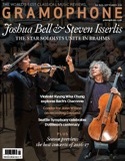Texte paru dans: / Appeared in: |
|
|
Outil de traduction (Très approximatif) |
|
|
Reviewer:
David Vickers
Its 10 trio sonatas are constructed as suites of preludes and dances, and all are played superbly by La Real Cámara. Principal violinist Emilio Moreno – the co-founder of the Glossa label – calls Castro ‘The Spanish Corelli’, and that is borne out by the crystalclear unfurling of lines played with impressive responsiveness and rhetorical persuasion by Moreno and Enrico Gatti (the collaboration of Spanish and Italian violinists seems apt). Cellist Mercedes Ruiz provides subtle counterpoint on the bowed bass-lines, and continuo realisations by the brothers Pablo (guitar/theorbo) and Aarón Zapico (harpsichord) range between full and lively in quick music and more sparsely restrained in the slow music.
The ninth sonata travels from a
beautiful adagio Preludio to its gently playful concluding Minuet (which here
has hints of Spanish dance on account of Pablo Zapico’s use of syncopated
strumming guitar). Likewise, the Gavotte that concludes the third sonata is
played with an infectious zest, and a unison Minuet in the first sonata suggests
traces of the composer’s Andalusian roots. At the Corellian end of the scale,
there is gracefulness in the central Allemanda in the 10th sonata, whereas the
slow Preludio of the seventh sonata has melancholic tension between delicious
dissonances and cathartic resolutions. If this whets anyone’s appetite for more
Castro, they will be disappointed – although a few more opuses were published,
most are lost. |
|




